![Types of AI Chatbots For Business [Automation and More]](/content/posts/ai-chatbot-for-business/Denser_AI_Chat_Example_1.png)
Types of AI Chatbots For Business [Automation and More]

How do businesses support customers without overburdening their teams?
The answer is AI chatbots. These tools use machine learning and Natural Language Processing (NLP) to understand customers and support them.
From answering questions to guiding purchases, chatbots are changing the way businesses connect with their customers. A purpose-built AI chatbot for business can handle these tasks while adapting to your specific workflows.
With machine learning, chatbots get smarter with every interaction and learn how to respond better over time. Using natural language processing, they can understand and reply in simple, everyday language to make conversations feel natural.
In this article, we will explore how AI chatbots work, the benefits they bring to businesses, and how to choose the right chatbot for your needs.
Benefits of AI Chatbots in Business#
AI chatbots are valuable tools that solve specific problems businesses face every day. They are designed to help companies save time, cut costs, and improve interactions with customers.
Below, we’ll explore how AI chatbots can address these challenges in practical ways.
Manage Large Numbers of Customer Questions#
Many businesses find it challenging to handle a high volume of customer questions, especially during sales events, product launches, or holiday seasons.
AI chatbots provide a scalable solution that allows you to respond to large numbers of queries simultaneously without delays or achieve cost savings.
AI chatbots respond immediately to customer inquiries, which reduces the frustration caused by long wait times. Quick answers keep customers satisfied and engaged, preventing them from leaving your site or turning to competitors.
Keep Website Visitors Interested#
Many visitors leave a site without taking any meaningful action, such as making a purchase, signing up for a service, or filling out a form. AI chatbots can address this issue by creating dynamic, interactive interactions.
AI chatbots don’t wait for visitors to ask for help. They initiate conversations based on user behavior, such as how long a visitor has been on a page or the pages they’ve browsed.
Proactive messages create a sense of assistance without being intrusive, which prompts visitors to interact rather than leave the site.
Ask for Feedback in a Natural Way#
Businesses need customer feedback to improve, but most people don’t like filling out long surveys. AI chatbots provide a better solution by collecting feedback conversationally.
AI chatbots can ask for feedback at moments when customers are most likely to respond, such as immediately after a purchase, interaction, or service completion.
Chatbots use natural language to make feedback requests feel more like a friendly conversation than a formal survey. They also keep the process simple by breaking feedback into smaller, easy-to-answer questions rather than overwhelming users with lengthy forms.
Want to make collecting feedback easier and more effective? With Denser.ai, your chatbot can gather valuable customer insights through natural, conversational interactions.
Request a product demo, or sign up for a free trial today!
Serve Customers in Different Languages#
Companies with customers from around the world often face language barriers. AI chatbots can automatically switch languages based on what the customer speaks to make it easier to communicate. Enterprise AI chatbot solutions provide multilingual support that scales globally without additional training.
Multilingual chatbots can automatically detect the language a customer is using based on their input and respond in the same language.
Assign Leads to the Right Teams#
Effective lead management is essential for converting potential customers into paying clients. However, many businesses struggle to route leads to the appropriate teams, which results in missed opportunities.
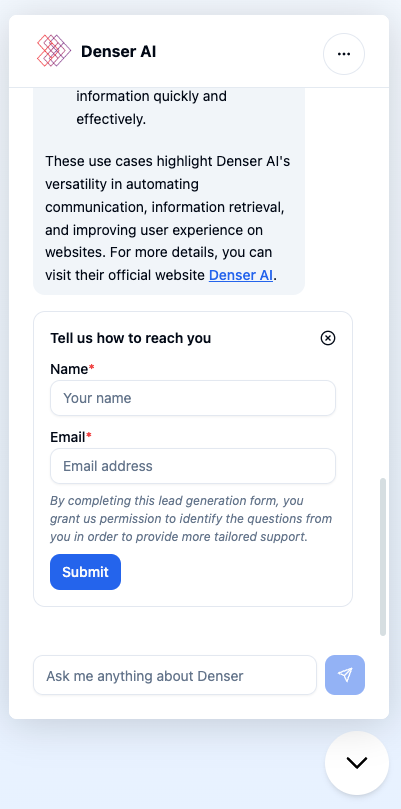
AI chatbots can ask relevant questions to determine the needs, budget, and preferences of potential customers. These responses help segment leads into categories like high-priority prospects or those requiring further nurturing.
After qualifying leads, chatbots assign them to the appropriate teams based on predefined rules such as location, product interest, or urgency.
Make Internal Workflows Smoother#
AI chatbots are not just for customer-facing tasks. They also simplify internal workflows and help teams automate repetitive tasks and manage routine processes.
AI chatbots simplify the onboarding process for new hires by automating document collection, training schedules, and FAQs about company policies.
Employees often have questions about HR policies, IT issues, or administrative tasks. Chatbots provide instant, accurate responses, which lessens the dependency on human resources or IT teams.
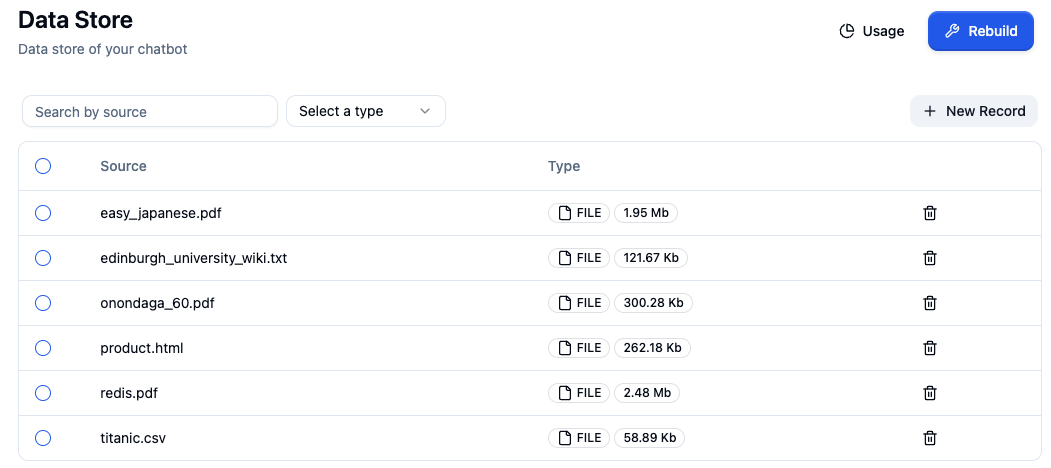
With Denser.ai, your team can interact with websites, PDFs, and documents in multiple languages to get instant insights and answers. No more digging through files or waiting for support.
Popular Use Cases of AI Chatbots for Business#
AI chatbots can be used in many ways to address specific business challenges. They are versatile tools that help improve customer interactions, support internal operations, and drive sales.
Customer Support and Service#
Customer service chatbots are widely used to handle tasks, especially for answering common questions and resolving basic issues. They help businesses provide faster service while reducing the workload on human agents.
Sales and Marketing Assistance#
AI chatbots can guide customers through the sales process by providing product recommendations, answering pre-purchase questions, and even helping users complete transactions.
E-commerce and Retail Support#
Ecommerce chatbots are used to manage tasks like tracking orders, handling returns, and assisting customers during the checkout process.
Chatbots improve the shopping experience by making it more interactive, and customers save time when finding what they need.
Healthcare Applications#
AI chatbots help healthcare providers simplify appointment scheduling, send reminders, and provide patients health-related information.
A hospital chatbot allows patients to schedule appointments based on doctor availability or receive medication reminders. Chatbots improve patient communication without overwhelming staff.
Finance and Banking Support#
Financial institutions use chatbots to provide account information, guide customers through transactions, and even assist with budgeting advice.
Fintech chatbots offer quick solutions to common banking needs and provide a secure way to access account information.
Employee Support and Training#
Businesses also use AI chatbots internally to speed up workflows and assist employees with tasks like onboarding, IT troubleshooting, and training.
Employees get immediate support without waiting for IT teams. Training also becomes more accessible and less time-consuming.
How to Choose the Right AI Chatbot for Your Business#
Factors like features, integration options, and pricing models play a huge role in finding the best AI chatbot. Here’s how to make your choice simple and effective.
Focus on Your Business Goals#
Every business has different challenges. Some need help responding to customer questions, while others want to boost sales or make their internal processes smoother.
A chatbot that aligns with your goals will save you time, improve efficiency, and give your customers a better experience.
Write down specific things the chatbot should do, such as answering FAQs, assisting with purchases, or collecting customer feedback after a service.
Then, decide how you will measure success. Examples include:
- Reducing customer wait times by 50%
- Increasing online sales by 20%
- Saving employees 10 hours per week on repetitive tasks
Once your goals are clear, look for a chatbot with features that match them.
Pick a Chatbot That Fits Your Industry#
A general-purpose chatbot may work for simple tasks, but it might not effectively handle specialized requirements. To reduce the need for pricey customizations, look for chatbots that already have features tailored to your industry.
Think about the most frequent questions or requests your business gets. These are often the tasks a chatbot can automate.
Specific industries, like healthcare or finance, require features such as customer data encryption or compliance with regulations.
Look for One That Can Grow With You#
As your business expands, the demands on your chatbot will increase. This could include handling more customer interactions and supporting new channels. A scalable chatbot can adapt to these changes without requiring a complete overhaul.
The chatbot should let you add advanced features like personalized recommendations, voice interaction, or AI learning capabilities over time.
If you expand to new markets, the chatbot should support additional languages and localize responses for different cultures.
Keep It Simple for Your Team#
A chatbot is only helpful if your team can set it up, manage it, and make changes when needed. If the chatbot is too complex or requires advanced technical skills, it may create more problems than it solves.
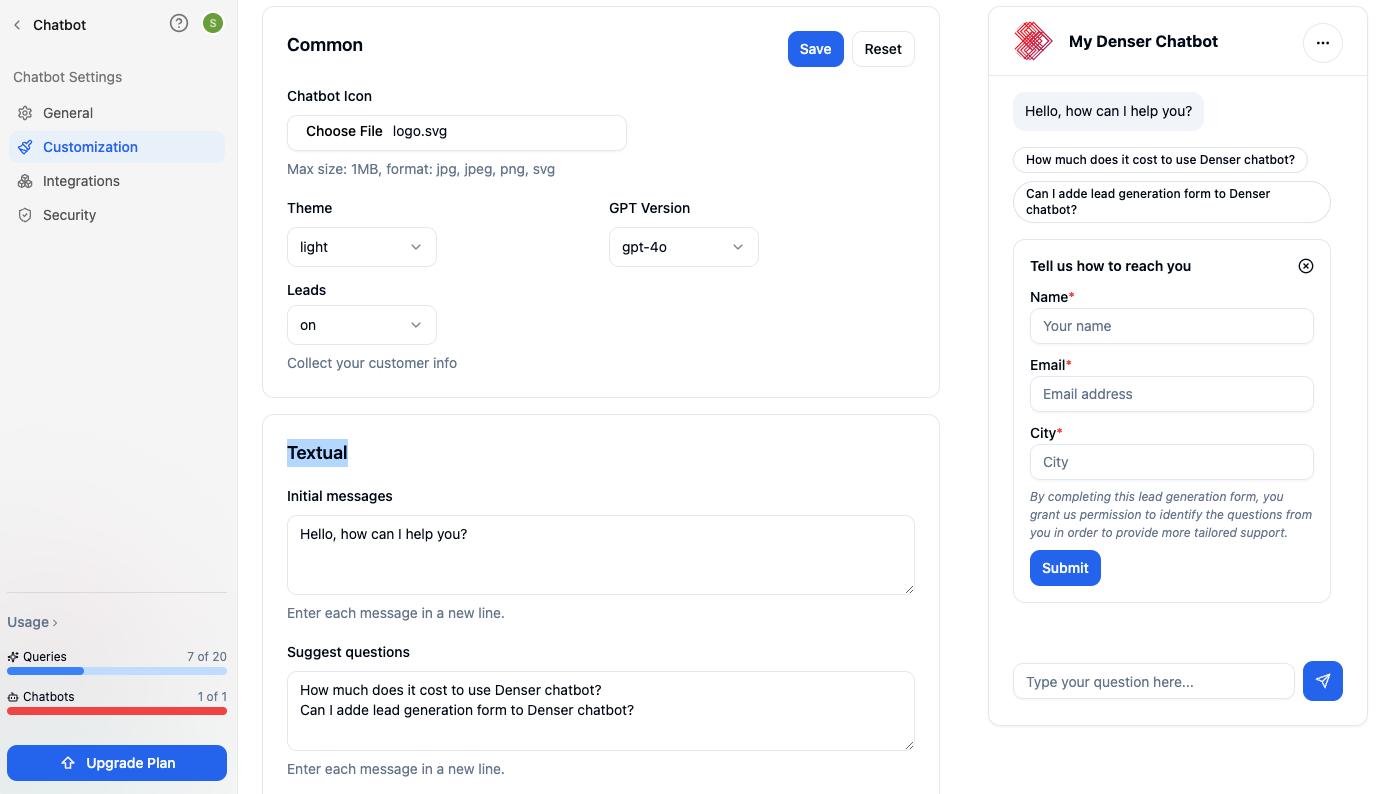
Many modern chatbots let you build workflows and responses using simple tools without needing programming skills.
Look for chatbots that come with templates for common use cases like FAQs, appointment booking, or lead generation.
The chatbot should also connect easily to your existing systems, such as email, CRM, or helpdesk software, without complicated setup processes.
Check the Cost and Value#
A chatbot is an investment, and like any investment, it should provide measurable returns. If the costs outweigh the benefits, the chatbot may not be worth it for your business.
There are typically three main pricing structures for AI chatbots:
- Subscription plans involve paying a fixed monthly or annual fee and are suitable for businesses with consistent customer interactions.
- Pay-as-you-go models charge based on usage, which is a flexible option for seasonal businesses or companies with fluctuating traffic.
- One-time purchase often involves a higher upfront cost for custom-built solutions, which is ideal for businesses looking for long-term ownership without recurring fees.
Sometimes, the advertised price of a chatbot isn’t the full picture. Additional fees for integration, customization, or exceeding usage limits can increase the total cost. Similarly, creating a chatbot that reflects your brand’s tone or handles specific tasks may involve additional development fees.
Test Before You Decide#
Testing lets you evaluate a chatbot’s performance in handling your business-specific scenarios. It helps you determine if the chatbot can understand customer queries and provide accurate responses.
Testing ensures you invest in the right solution rather than discovering issues after launch.
Start with scenarios your customers face most frequently. This could include answering FAQs, guiding users to products, or handling basic troubleshooting. Pay attention to how quickly the chatbot responds and how often it provides correct answers.
Best Practices for Implementing an AI Chatbot#
Implementing an AI chatbot requires careful planning to ensure it meets your business needs and enhances customer satisfaction. Following these best practices will help you launch a chatbot that delivers value and integrates smoothly into your operations.
Start by defining key tasks, like answering queries or giving order updates. The best practices for chatbot testing highlight the need to test across all user scenarios to ensure smooth and accurate responses.
Set Clear Goals#
Without clear objectives, a chatbot may end up as a generic tool that fails to meet user expectations or business needs.
To start, identify the main challenges your business faces. These could include long customer response times, frequent product availability inquiries, or many abandoned shopping carts.
Once the challenges are clear, decide how the chatbot can address them. This might mean answering questions, guiding users through a purchase, or providing updates on orders.
Next, make your goals measurable. Instead of saying, “We want to improve customer service,” set a specific target like, “We want to reduce customer response time from 5 minutes to under 1 minute.” This way, you can track the chatbot’s performance and know whether it’s meeting expectations.
Finally, prioritize your goals. If your business faces multiple challenges, start with the one that brings the most value. If abandoned carts are a big issue, focus on a chatbot that assists customers during checkout before expanding its functionality to handle other tasks.
Choose the Right Type of Chatbot#
Different types of chatbots serve different purposes. The right type is essential to keep your chatbot aligned with your business goals.
Rule-based chatbots operate on predefined scripts and respond to specific commands. They are suitable for handling simpler tasks like answering frequently asked questions or guiding users through simple processes. However, they may struggle with complex or unexpected queries.
AI-powered chatbots utilize artificial intelligence to understand and process natural language that allows them to handle more complex interactions. They can learn from past conversations, adapt to user behavior, and provide personalized responses.
Denser.ai offers a platform that allows you to create customized AI-powered chatbots without requiring coding expertise. Whether you're starting from scratch or upgrading your current system, this AI chatbot platform is equipped to deliver seamless, intelligent support.
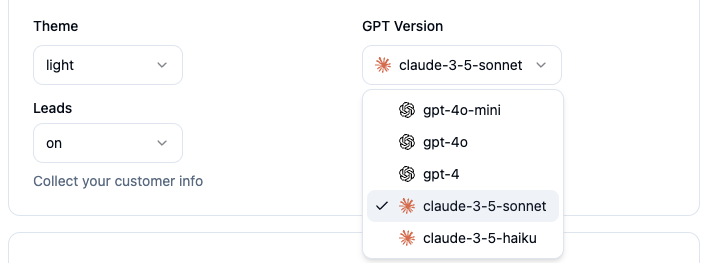
What makes Denser.ai even better is that you can choose the language model (LLM) that powers your chatbot. Therefore, you get to decide how it works and respond, so it’s a perfect fit for your business.
Train Your Chatbot Continuously#
Over time, your business may introduce new products, policies, or services. Customers may also start asking questions that your own chatbot wasn’t originally programmed to handle.
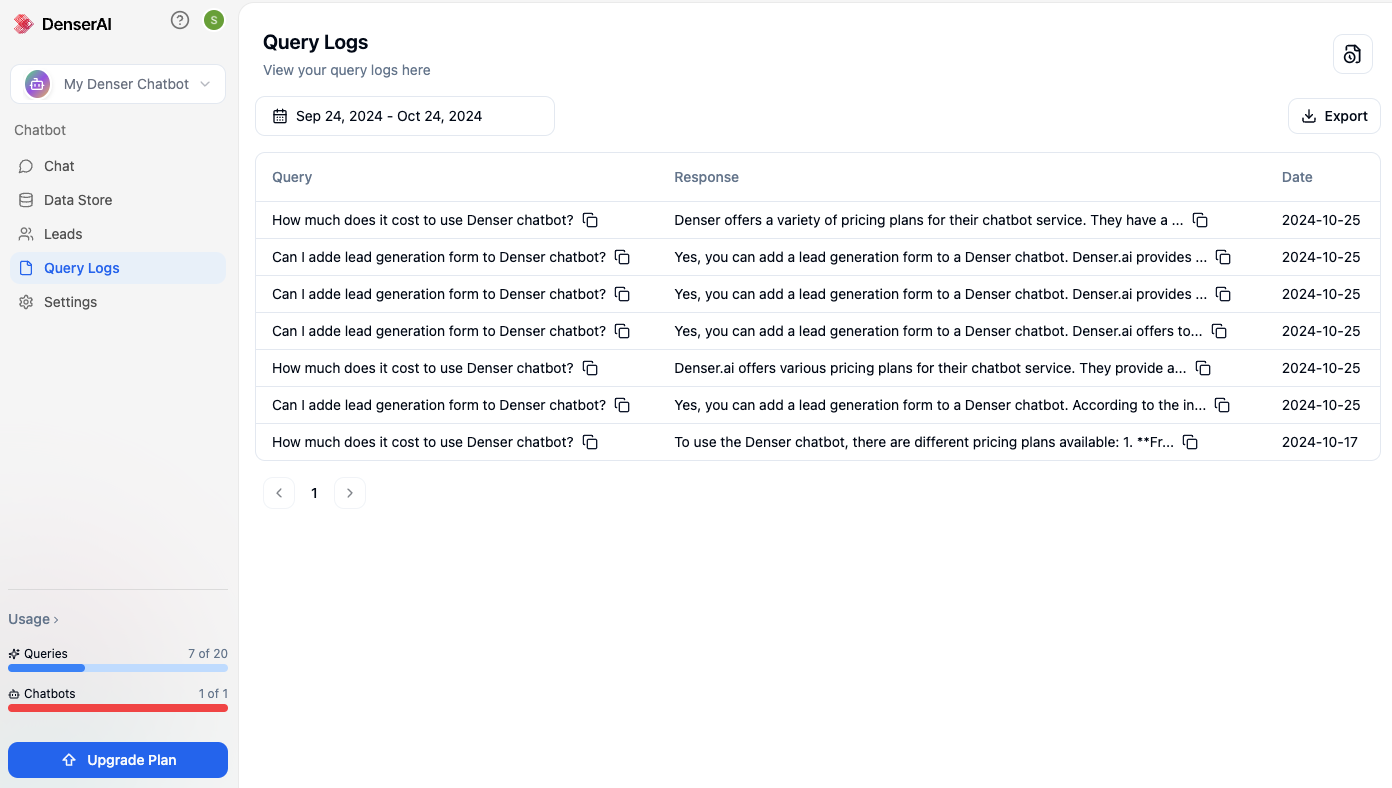
You need to review the chatbot’s conversation history to identify patterns, such as frequently asked questions, unclear responses, or unresolved queries. Use this data to update and train the chatbot’s responses or expand its knowledge base to answer common customer questions.
You may also collect feedback from customers about their chatbot experience. If users report that the bot is missing key information or misinterpreting queries, address those gaps immediately.
Combine Chatbots with Human Support#
Complex issues, sensitive inquiries, or emotionally charged situations often require the empathy and expertise of a human agent.
Human agents should be alerted when they need to step in. The chatbot should provide agents with the context of the conversation, including the customer’s query and any previous responses.
You may also give customers the option to connect with a human agent at any point. It reduces frustration if they feel the chatbot isn’t addressing their needs.
Make the Chatbot’s Purpose Clear to Users#
If users are unsure about the chatbot’s capabilities, they may ask questions the bot isn’t equipped to answer or expect services it can’t provide.
Therefore, introduce the chatbot at the start of the conversation with a brief description of its functions. Avoid technical jargon and use simple, conversational language to explain what the chatbot can do.
Make sure the chatbot’s name, tone, and design match your company’s branding to reinforce its purpose and role in your customer experience.
Better Engagement, Less Effort – Try Denser.ai!#
Do you find it hard to keep up with customer questions or repetitive tasks?
With Denser.ai, you can create an assistant that takes care of everyday tasks and frees up your team to focus on bigger priorities.
Denser.ai makes it easy for businesses to build assistants that work the way you need them to. These intelligent virtual assistants respond naturally to keep customers feeling heard and supported.
Denser.ai can improve customer engagement by creating smooth, helpful, and meaningful interactions every time. With no cost to get started, you can explore how this tool helps build strong, lasting customer relationships.
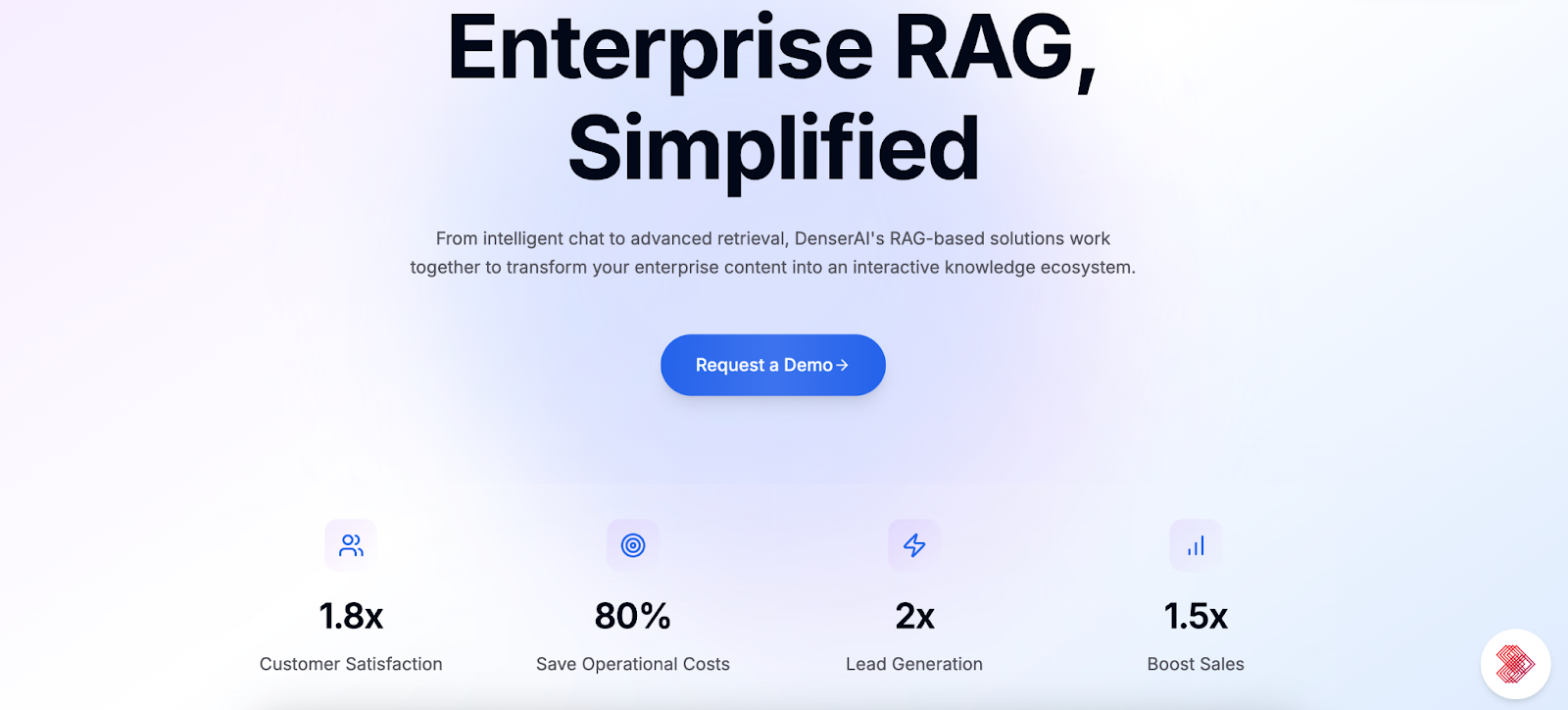
Request a product demo, or sign up for a free trial today!
FAQs About AI Chatbot for Business#
Which chatbot is best for business?#
The best chatbot for your business depends on your goals, but Denser.ai stands out as the best choice for businesses of all sizes.
It offers powerful AI-driven capabilities, allowing you to customize chatbots for tasks like customer support, lead generation, and sales. Denser.ai also integrates with tools like Slack, Shopify, and WordPress to ensure they fit into your existing workflows.
Is there a free AI chatbot?#
While many chatbot solutions offer free trials or limited free versions, Denser.ai focuses on delivering quality solutions tailored to business needs.
Denser.ai offers a free trial plan, perfect for businesses just getting started with AI chatbots. The plan includes one DenserBot, 20 queries, and the ability to store up to 100 documents or web pages.
What is the best AI chatbot available?#
The "best" AI chatbot varies based on specific use cases and business needs.
ChatGPT is widely recognized for its versatility and advanced language processing capabilities. Microsoft Copilot, integrated within the Edge browser and running on GPT-4 Turbo, offers advanced capabilities and is accessible for free.
Denser.ai combines advanced AI capabilities with ease of use to offer solutions that grow with your business. Its user-friendly platform and robust integrations make it the preferred choice for businesses aiming to deploy chatbots without extensive technical expertise.